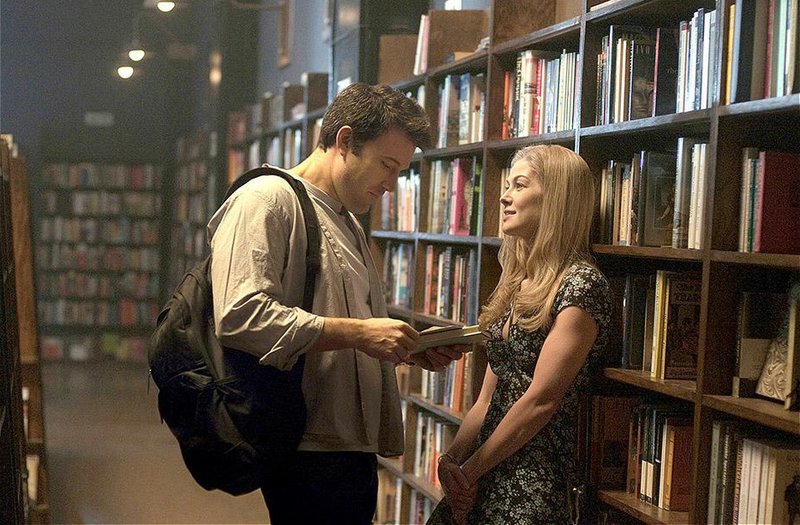There is something about Ben Affleck as an actor that can be eminently dislikable. This has absolutely nothing to do with him as a person, of which, as with any of us, precious little is truly known.
This is a pure, surface distillation. It's in his face, that underbite, the cleft of his protruding chin, perhaps a slightly disaffected look of insincerity you think you can detect in odd, small moments. The story goes that when director David Fincher was looking to cast the lead in his adaptation of Gillian Flynn's wildly popular novel about a wife who disappears, and the husband who becomes the prime suspect, he Googled Affleck and pursued him because of his creepy smile.
Gone Girl
85 Cast: Rosamund Pike, Ben Affleck, Kim Dickens, Tyler Perry, Neil Patrick Harris, Patrick Fugit
Director: David Fincher
Rating: R, for a scene of bloody violence, some strong sexual content/nudity, and language
Running time: 149 minutes
It's not all our fault, either. As human beings, we operate under a biological judgment imperative: Millennia ago, we needed to be able to assess risk and danger as fast as possible in our encounters with other humanoids. This quality has historically served us well -- likely one of the reasons we survived when other unfortunate species fell extinct -- but it also renders us a weak and neurotic lot, quick to judge , dismiss and condemn without sufficient cause or reason.
All of which leads us to the central premise of the film, which suggests that our quick and harsh judgments -- only heightened in the short-attention span news cycle and sound-bite, hot take media culture -- lead us dangerously down roads of facile oversimplifications and complete misunderstanding of what might actually be happening in another person's life.
As the film's main currency resides in its particular form of subterfuge and twisty plot complication, I will tread lightly as far as the story goes. Nick Dunne (Affleck), a genial bar owner in a picturesque town in Missouri, wakes one morning, meets his sister (Carrie Coon) behind the bar and comes home to find broken glass, blood spatters and his wife, Amy (Rosamund Pike), gone. In the resulting investigation, led by Detective Rhonda Boney (Kim Dickens) and her underling (Patrick Fugit), Nick is shown in an ever worse light, until it would seem (too) dead obvious that he is the culprit. Only -- and this gives little away -- he's so dead-on the suspect, and so early in the film, we suspect there has to be something else going on here, some level of intrigue as yet unexplored, and therein lies the rub.
Fincher, a supremely talented filmmaker with a gift for astonishing visual style, has too often been placed in the same disaffected filmmaking camp as Stanley Kubrick, whose tremendous films are often criticized for being too cold and stylized to convey the depth of human feeling. While I strongly disagree with the sentiment as a general rule -- Kubrick's films are filled with emotion, only it resides more in their effect on the viewers than in the characters they depict -- it would be hard to argue this film contains much in the way of emotional profundity. It plays a peculiar tonal game somewhere between pumped-up thriller and simplistic satire. Scenes play for drama at first but become more and more unglued as the plot contrivances commence, until it's unclear whom we can root for, what the truth might be, or really why we should care about any of it.
Using Amy's journal as a sort of framing device, beginning in the deepest throes of love in 2005 and somehow unwinding seven years later into admissions that she fears for her life, Fincher repeatedly references the couple's past, supposedly giving us insight into what went wrong and how bad it might have gotten. As Amy's ever more dire and desperate journal entries depict, the lines between victim, aggressor and sociopath become more and more blurred. All of which enhance the film's secret plot twist -- only in a way that renders much of the rest of the film pretty much pointless. We might like the idea of a story with this kind of deceit at its core, but it quickly descends into story for story's sake, like a clumsy Boy Scout leader garbling a ghost story in front of an increasingly frustrated troop sitting around a campfire.
The trouble with this device is that it leaves virtually no one and nothing to get emotionally connected to, which burns down the film to its plot points, as impressive as they may be, and precious little else. Fincher has clearly toned down his more daring flights of visual fancy to bring us the nuts and bolts of the story but like The Curious Case of Benjamin Button, it feels almost a waste of his talents to reduce him to this kind of sober, competent filmmaking: He might be telling a twisty, vaguely satiric story about our insatiable media consumption and the ways in which insta-celebrities must quickly learn to navigate the tricky tributaries of media exposure and audience metrics, but at its heart, it's just a fairly bland thriller by any other name, every bit as silly and unremarkable as the dregs the genre typically embraces. Affleck makes for an effectively allusive protagonist, but the rest of the film is way too readily apparent.
MovieStyle on 10/03/2014

